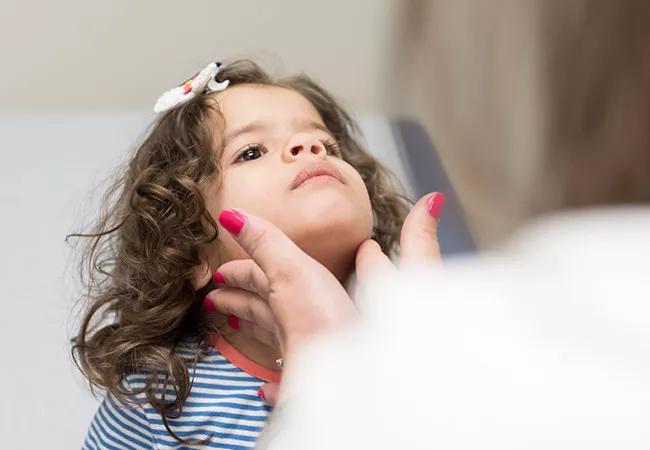Innovative therapies and research are hallmarks of new center

Oral immunotherapy drug Palforzia, approved by the FDA in early 2020, has changed the treatment landscape for children with peanut allergies — at least those ages 4-17. But children under age 4 also have oral immunotherapy options. Early peanut oral immunotherapy (EPOIT) is possible and has been effective in carefully selected young patients with peanut allergies at Cleveland Clinic’s Food Allergy Center of Excellence (FACE).
Advertisement
Cleveland Clinic is a non-profit academic medical center. Advertising on our site helps support our mission. We do not endorse non-Cleveland Clinic products or services. Policy
“We’ve had 30 kids participate to date,” says Cleveland Clinic allergist and immunologist Sandra Hong, MD, Director of the FACE. “Two withdrew for unrelated reasons. Of the 28 remaining participants, with a combined total of more than 10,000 doses, only one child has required epinephrine. Nearly 70% of these patients currently are tolerating our maintenance dose of peanut protein, and the rest are continuing to build up to it.”
EPOIT patients, all age 3 and younger, consume small quantities of peanut protein in gradually increasing doses. As the amount of peanut protein increases over a series of weeks, patients develop tolerance, which they maintain indefinitely with daily exposure to approximately 500 mg of peanut protein, the equivalent of two peanuts.
“Conventionally, without EPOIT, we would have advised peanut avoidance and hoped for peanut tolerance to develop on its own,” says Dr. Hong. “But only 20% of kids with a peanut allergy develop tolerance naturally. Assuming that statistic, most patients in our program likely never would have tolerated peanut exposure.”
Approximately 80% of children with egg and milk allergies — which, with peanut, comprise the majority of food allergies in early childhood — develop tolerance naturally. Ingesting baked egg or baked milk in food can help children develop tolerance quicker, adds Dr. Hong. As such, peanut allergies remain a focus of the FACE. Tree nuts, soy, wheat, shellfish and finned fish round out the top eight allergens the FACE team addresses.
Advertisement
In addition to novel treatments like EPOIT, the FACE provides comprehensive care for patients of all ages with food allergies. The multidisciplinary team — the first of its kind in Northeast Ohio — includes a psychologist and registered dietitians.
“It’s very common to see patients that have some level of anxiety about their food allergy and its treatments,” says Cleveland Clinic psychologist Wendy Hahn, PsyD. “Most of their lives, they have had to think about what may happen if they eat something that may trigger a reaction, even when vigilant about monitoring. Some have had frightening experiences, being rushed to the Emergency Department, and many are fearful of injections and are scared to use their epinephrine auto-injector. When discussing treatments, like oral food challenges, patients have to manage the anxiety that comes with eating something they have previously been told not to eat.”
Aside from the threat of allergic reactions, kids with food allergies often endure social stress, says Dr. Hahn. Children experience exclusion from parties and other activities because of their food risk. Research shows that the chance of being bullied increases with a food allergy diagnosis.
All patients at the FACE who report bullying are encouraged to meet with Dr. Hahn. So are families with older children receiving oral immunotherapy (OIT), including Palforzia.
“Kids and their families take on increased risk with OIT,” says Dr. Hahn. “We work on decision making for treatment, and techniques to handle the anxiety and fear of potential reactions.”
Advertisement
Families also meet with a registered dietitian, who can individualize diet plans and recipes for the unique needs of those with food allergies.
“Dietitians review food labels and instruct families to target or avoid certain ingredients,” says Dr. Hong. “They ensure kids with multiple food allergies are getting the nutrients they need while staying safe.”
Research efforts at the center are exploring new methods of treating and even preventing food allergies. For example, Cleveland Clinic allergist and immunologist Leigh Ann Kerns, MD, is a principal investigator in the international, multicenter EPITOPE study. EPITOPE is assessing the safety and efficacy of a peanut patch to induce desensitization in peanut-allergic children ages 1-3. Associate Director of the FACE Jaclyn Bjelac, MD, is the principal investigator of a clinical trial evaluating boiled peanut oral immunotherapy in children ages 1-16.
To help schools prevent and be prepared for allergy emergencies, Cleveland Clinic allergist and immunologist Alice Hoyt, MD, has developed the Code Ana program. Dr. Hoyt provides local schools with prescriptions for stock epinephrine auto-injectors as well as training on how and when to use them.
“The mission of our Center is to use the latest therapies, multidisciplinary care and leading research to treat patients with food allergies as well as improve their lives,” says Dr. Hong.
Advertisement
Advertisement

Findings hold lessons for future pandemics

One pediatric urologist’s quest to improve the status quo

Overcoming barriers to implementing clinical trials

Interim results of RUBY study also indicate improved physical function and quality of life

Innovative hardware and AI algorithms aim to detect cardiovascular decline sooner

The benefits of this emerging surgical technology

Integrated care model reduces length of stay, improves outpatient pain management

A closer look at the impact on procedures and patient outcomes